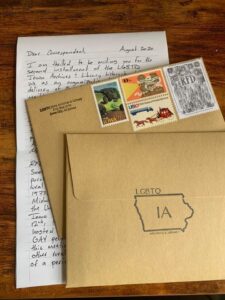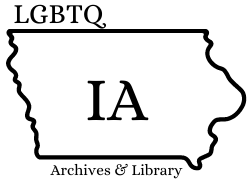 Last month’s letter on the history of the Iowa City Women’s Press has inspired the topic of this current letter – a publication with its roots in Iowa: RFD: A Country Journal for Gay Men Everywhere.1
Last month’s letter on the history of the Iowa City Women’s Press has inspired the topic of this current letter – a publication with its roots in Iowa: RFD: A Country Journal for Gay Men Everywhere.1
RFD was first envisioned by Stewart Scofield of Grinnell, Iowa after he had purchased a copy of Country Women, a rural feminist journal for his housemate in 1973.2 In 1974 Scofield attended the Midwest Gay Pride Conference, hosted on the University of Iowa’s campus in the Iowa Memorial Union. On Saturday, April 12th, 1974 from 9:00-10:00am the conference hosted a meeting titled, “COUNTRY GAY peoples organizing session.”3 At this meeting Scofield was able to meet other rural gays and propose the creation of a periodical. Two key travelers stopped at the conference: Carl Wittman and Allen Troxler. Both were traveling from rural North Carolina to rural Oregon, becoming early co-authors of RFD with Scofield.4
RFD was born an anti-urban publication, resisting narratives of rural to urban queer migration throughout the 1960s & 1970s. As a publication it countered the growing metronormativity of gay & lesbian life by demonstrating the possibility of a back-to-the-land methodology for Gay Liberation.5 The magazine offered an avenue for readers to participate in a rural gay community. It provided an emotional outlet and an avenue for empowerment in the face of discrimination from urban-living gays.6
The term “R.F.D. Queen” in gay vernacular dates back to the 1930s and meant:
a homosexual who lives in the country or in a small town, and who has homosexual impulses or desires, but who does not understand the argot and ways, or know the habits and places of congregation of the homosexual fraternity in cities and metropolitan centers.7
Reclaiming RFD for the title of the magazine allowed rural gays to acknowledge their collective experiences of exclusion from the broader gay community and to gather strength in holding space together.
It is important to note that RFD was originally published by the Iowa City Women’s Press. Although first penned & perpetually marketed as a magazine for gay men RFD included the following statement in their first issue:
No women have contributed material for this first issue, but we hope it is not so-male oriented/dominated to prevent lesbians from using this magazine for communication.8
With the sources and time currently available, I cannot assess the extent of lesbian inclusion in RFD, yet it is clear that lesbian women occasionally wrote in to the magazine.
There is some historical confusion surrounding RFD and its relationship to the radical faerie movement of the early 1980s. This has led to the false assumption that RFD stands for “radical faerie digest.” Quite the opposite as every issue of RFD has a different title for the acronym. Excuse my need to list and share the early titles:
- Rustic Fairy Dreams
- Reckless Fruit Delight
- Really Felling Devine
- Rabbits, Faggots, and Dragonflies
- Raving Flamer’s Diary
- Red Fire Dragons
- Rhododendron Forsythia Daffodils
- Raspberries, Fresh & Delicious
- Remembering Forgotten Dreams
- Ravens Fleeing Darkness9
Do enjoy those titles, the first six of which were published in Iowa.
Throughout its lifespan RFD has moved around the country for publication. The original P.O. Box for RFD was in Grinnell, Iowa, Scofield living nearby. With Wittman and Troxler involved, the publication moved to Wolf Creek, Oregon for the remainder of the 1970s. In 1980 the publication then moved to Running Water Farm in North Carolina. By the mid-1980s RFD was published out of Short Mountain Sanctuary in Tennessee. In the 21st Century, RFD has consistently been published in the Northeast including New England, New York, and Massachusetts. We must not forget its Iowa roots.
Although the publication of RFD continues, it is no longer a magazine explicitly for country gay men nor does it prioritize the rural. This magazine was originally distinctly Iowan, gay, and rural making it a treasure of our current queer locality. We are actively seeking copies of, at minimum, the first six issues of RFD that were published in Iowa. We’ve reached out to the magazine for copies yet would prefer to acquire a run of the magazine collected here, in Iowa.
Please reach out if you know of any issues waiting to be archived, here at home in Iowa.
In solidarity and love
Notes
- The name of the magazine connotes the “rural free delivery” service of the United States Postal Service. RFD began in 1896 as a mail service to deliver directly to farmers. It was originally an experiment — one in high demand — becoming an official service of USPS nation-wide July 1, 1902. The word “free” was dropped in 1906, emphasizing the rural-centric nature of this service. “Rural Free Delivery,” USPS, accessed August 19, 2020, https://about.usps.com/who-we-are/postal-history/rural-free-delivery.htm.
- Stewart Scofield, “RFD History,” RFD 9, no. 3 (1983): 9. Having our first two history-by-letters center Iowa City and Grinnell because these cities are home to our affiliated oral history projects: the Transgender Oral History Project of Iowa based in Iowa City and the LGBT Oral Histories of Central Iowa based in Grinnell.
- “Midwest Gay Pride Conference,” Stewart Scofield Collection on RFD, Coll2011-072, ONE National Gay & Lesbian Archives, Los Angeles, California.
- Jason Ezell, “‘Returning Forest Darlings’:Gay Liberationist Sanctuary in the Southeastern Network, 1973-1980,” Radical History Review 135 (2019): 72.
- Scott Herring, “Out of the Closets, Into the Woods: RFD, Country Women, and the Post-Stonewall Emergence of Queer Anti-Urbanism,” American Quarterly 59, no. 2 (2007): 343.
- Korbin Painter, “Loneliness and Liberation: RFD, Emotion, and Geography in the Gay Liberation Era” (Master’s thesis, The University of Iowa, 2019), 2-3.
- Gershon Legman, “The Language of Homosexuality (1941),” in Gay/Lesbian Almanac, Jonathan Ned Katz (New York: Harper and Row Publishers, 1983), 582.
- RFD Collective, “Rustic Fairy Dreams,” RFD 1 (1974): 3.
- “RFD Issues,” RFD Magazine, accessed August 20, 2020, https://www.rfdmag.org/back-issues.php

 Donate
Donate